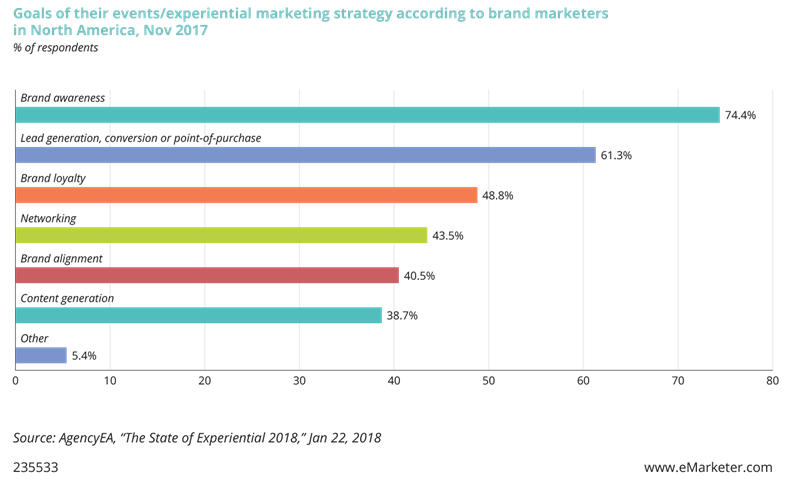Need fresh thinking? Help is a few keystrokes away.
Provide an Exceptional Experience
Give them an experience to remember, and fans will keep coming back for more. That’s why today’s sports marketing events, often featuring an interactive experience, are designed to mimic the thrill of winning—in triple overtime.
Just take a look at what teaming up with public relations and social media to execute a sports marketing event can do:
- Adidas wooed urban teens with a popup D’Rose Jump Store where visitors could score free shoes, as long as they could nail jumping high enough to reach them.
- Red Bull pumped up fitness enthusiasts with Spin classes in three cities, complete with light shows and 100 influencers pedaling the excitement across multiple social media channels.
- And the David Lloyd gym group set up a “Run for your Bun” café where one could pay for menu items, including a pulled pork burger, with crunches, planks, squats, time on the rowing machine and more.
In a world where sports and entertainment are increasingly connected, experiential marketing opportunities to host or be part of an event such as these are nearly endless. In fact, event marketing is a key element of sports marketing today, and a critical element of the overall marketing mix that can include specially themed activities, displays or exhibits to promote a company, products and services.
Aim for the Goaaaaaal!!!
But before deciding to host a Hawaiian-themed luau on the beach for your surf shop, or throwing your financial support behind one of the local baseball teams with a “boys of summer” event, it’s important to define your goals. Which, if any, of the following do you hope to achieve?

- Launch new products/services
- Enhance or revitalize brands
- Attract new customers and expand market reach
- Reward customers and build loyalty
- Open new markets/retail locations
- Sample products or services
- Reinforce advertising, sales and marketing
- Activate sponsorships and partnerships
- Benefit a worthy cause or issue
- Strengthen community ties
- Boost employee morale
- Celebrate anniversaries and milestones
- Attract media attention
- Provide unique customer experiences
Of course, more than one of these will likely apply. So set top priorities, decide how you’ll measure success and direct your efforts accordingly.
Create a detailed plan
Once the goal is defined and success criteria are in place, it’s important to think through each phase of planning and execution.
Your sports event planning playbook should include a complete outline of a step-by-step process—from concept to conclusion. Consider each of the following:
- Strategy and plan development: Begin by setting the stage. What do you wish to accomplish, who is your target audience, and what message do you want to deliver?
- Theming, creative treatments, visual styling and design: What tactics will you use, how will you leverage them for greatest impact, and how does each element contribute to the successful delivery of your message?
- Vendor and venue search, selection and contract management: Selecting the right location can make all the difference, so be choosy. The same goes for vendors. Make sure they can deliver what you need when you need it. Get it all in writing and in language you understand.
- Invitations, RSVPs and attendee tracking: Make a guest list (or choose a public location where your guests will automatically self-select). Follow up with who’s coming so you don’t wind up over—or under—preparing.
- Celebrity and entertainment overlay: Is there a spokesperson or influencer whose image would add oomph to your message? Is there an activity or angle you’ve overlooked that would add entertainment value?
- Promotional products, giveaways and sampling: The most important takeaway is a great experience. Provide physical, sensual, tangible reminders guests can touch, taste or share with a friend.
- Sponsorship support: You often don’t have to go it alone. Identify a partner who stands to benefit and invite them to share expenses.
- Media relations and publicity: If it isn’t on the news or shared on social media it never happened. Well, not exactly. But you get the idea.
- Budget supervision: It’s easy to go over budget unless someone is keeping track of expenses in real time.
- Results tracking and ROI measurement: Decide ahead of time what you will count or measure to determine success, and how you will do so. When it’s done, take the time to analyze your results.
Ideally, you won’t have to do it alone.
Need help?
Not sure where to start? LAVIDGE can help. Our dedicated subject matter experts in Public Relations, Social Media and Publicity can help you plan and execute a sports marketing event, customized just for you.
At LAVIDGE, we develop creative and strategic events to support the overall marketing strategy and campaign in a live format. We specialize in conceptualizing, organizing and marketing your event to the right audience. To ensure success, we work collaboratively to make certain every aspect is planned in advance and provide our clients with A-to-Z support.
To learn more, give us a call at 480.998.2600 or send email to [email protected].
Host an experience that delivers
Nearly 75% of all marketing events are designed to build brand awareness. Courtesy of eMarketer.com, see how professionals across the nation prioritize outcomes.

Methodology: Almost 1,000 industry professionals from various industries across Fortune 500 companies, agencies and vendors were surveyed during October 24-November 23, 2017. Respondents are primarily from North America and are from B2B (63.4%), B2C (46.6%) and B2E (13.1%) companies. Respondents identified their job roles as associate (18.6%), director (25.5%), entry-level (2.3%), executive (11.8%), intern (1%) and mid-senior level (41.8%). AgencyEA is a brand experience agency.
2018 Southwest Sports Marketing Report



